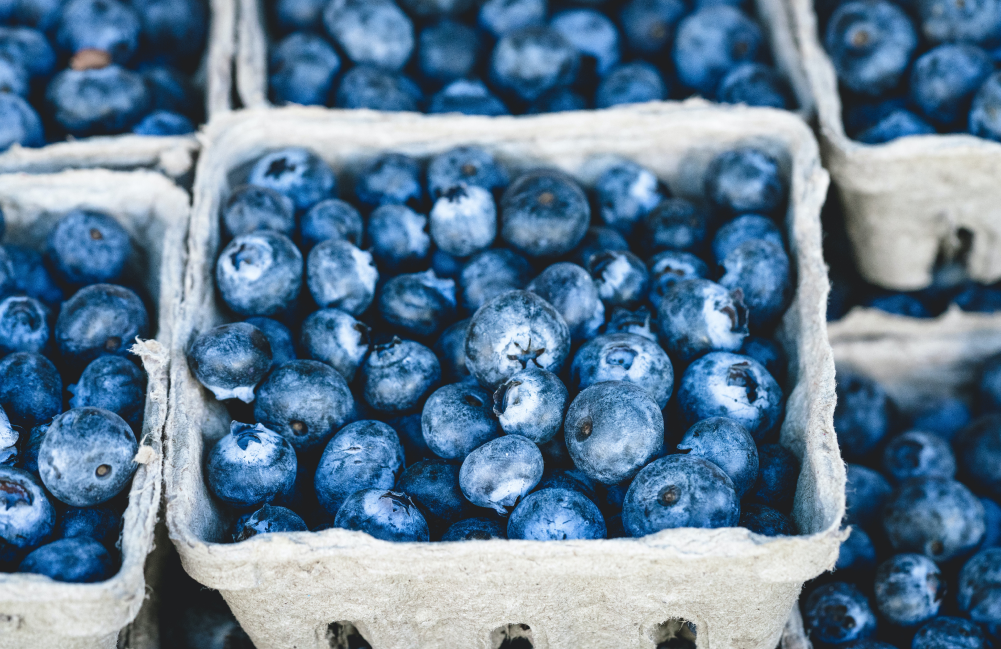Quick question: What do blueberries, probiotics and kombucha all have in common? Well, all three of these have been linked to better digestion, and helping you poop better. Yes, we know. You probably didn’t think that blueberries aided in digestion too, but as science reveals, there’s a lot that happens to your digestive system when you eat them.
So do blueberries actually have this kind of power, and how exactly can they alleviate constipation? We'll explore all the facts about this little berry and its potential health benefits, as well as why it might be good for your digestive system.
Whether you're trying to increase your fiber intake or simply seeking a delicious snack option, it's time to take a closer look at just what these powerhouse berries can do for you.
Table of Contents
The Science Behind Constipation

Constipation is a common digestive issue that many people experience at some point in their lives. It occurs when bowel movements become less frequent or challenging to pass.
While the topic might not be the most glamorous, understanding the science behind constipation can help shed light on why it happens and how to alleviate it.
At its core, constipation is often a result of slow movement of stool through the colon. This sluggishness can be caused by various factors, including a lack of dietary fiber, inadequate fluid intake, sedentary lifestyles, and certain medications.
When the stool moves slowly, more water gets absorbed from it, making it harder and drier, leading to difficulty in passing it out of the body.
Do Blueberries Have A Laxative Effect?

Blueberries have gained a reputation beyond their delightful sweet taste. One of the rumors surrounding these vibrant berries is that they may have a laxative effect. But is there any truth to this claim? Let's delve into the scientific evidence and separate fact from fiction.
While blueberries are indeed rich in essential nutrients and dietary fiber, which is beneficial for digestive health, there is limited direct evidence to support the idea that they act as a natural laxative. Laxatives are substances that stimulate bowel movements and help relieve constipation.
Blueberries contain dietary fiber, which can aid in promoting regular bowel movements by adding bulk to the stool and supporting healthy digestion. However, they are not typically potent enough to be classified as a strong laxative.
The fiber content in blueberries, along with their natural sorbitol content, can contribute to improved bowel regularity for some individuals. Sorbitol is a sugar alcohol that can have a mild laxative effect in larger quantities.
However, the amount of sorbitol present in blueberries is relatively low compared to other fruits like prunes or cherries, which are better known for their laxative properties.
How Do Blueberries Make You Poop

As we've explored earlier, blueberries are not known for having a strong laxative effect, but they can contribute to better digestive health. So, how exactly do blueberries support your digestive system and potentially help regulate bowel movements? Let's take a closer look at the mechanisms behind their impact on digestion.
- Dietary Fiber: Blueberries are a good source of dietary fiber, which plays a crucial role in maintaining healthy digestion. Fiber adds bulk to the stool, making it easier to pass through the intestines. It also helps prevent constipation by promoting regular bowel movements. The soluble fiber in blueberries absorbs water and forms a gel-like substance in the intestines, which can soften the stool and aid its passage.
- Prebiotics: Blueberries contain natural prebiotics, which are substances that promote the growth and activity of beneficial gut bacteria. A healthy gut microbiome is essential for efficient digestion and regular bowel movements. By nourishing the friendly bacteria in your gut, blueberries indirectly support digestive health.
- Antioxidants: Blueberries are rich in antioxidants, such as anthocyanins and flavonoids, which have anti-inflammatory properties. Inflammation in the gastrointestinal tract can contribute to digestive issues, and the antioxidants in blueberries may help soothe and protect the digestive system.
What If I Eat Too Many Blueberries
While blueberries are undoubtedly a nutritious and delicious fruit, consuming them in excess, like anything else, may have some potential downsides.
One of the primary concerns of overindulging in blueberries is their natural sugar content. Although the sugar in blueberries is natural and healthier than refined sugars, eating large quantities may still lead to an increase in blood sugar levels, especially for individuals with diabetes or insulin sensitivity.
Additionally, blueberries, like most fruits, contain fructose, which in excessive amounts can cause bloating, gas, and gastrointestinal discomfort in some individuals.
Moreover, consuming an excessive number of blueberries could lead to an increased intake of calories, which may contribute to weight gain if not balanced with overall calorie expenditure.
While enjoying blueberries as part of a well-rounded diet is beneficial, it's essential to practice moderation and listen to your body's signals. As with any dietary choices, variety and balance are key to ensuring you reap the benefits of this vibrant fruit without overdoing it.
Some Other Benefits Of Eating Blueberries
Blueberries not only tantalize your taste buds but also offer numerous health benefits that make them a nutritional powerhouse. Here are some additional advantages of incorporating these tiny berries into your diet:
Managing Diabetes
For individuals with diabetes, blueberries can be a great addition to their meal plan. These berries have a low glycemic index, which means they cause a slow and steady rise in blood sugar levels compared to high-glycemic foods. The presence of anthocyanins, the potent antioxidants responsible for the blueberries' vibrant hue, may also play a role in improving insulin sensitivity.
Studies suggest that consuming blueberries regularly might help lower blood sugar levels and reduce the risk of complications associated with diabetes. However, it's essential to enjoy them as part of a balanced diet and work with a healthcare professional to manage your diabetes effectively.
Lowering Blood Pressure
Maintaining healthy blood pressure is vital for cardiovascular health, and blueberries may offer some support in this area. The bioactive compounds in blueberries, such as flavonoids, have been linked to improved blood vessel function and blood pressure regulation.
Regular consumption of blueberries has been associated with modest reductions in systolic and diastolic blood pressure levels. Including blueberries as part of a heart-healthy diet, along with other lifestyle modifications, can contribute to better blood pressure management and lower the risk of heart disease.
Cancer Prevention
Blueberries boast an impressive lineup of antioxidants, including vitamin C and various phytochemicals like quercetin and kaempferol. These antioxidants play a crucial role in neutralizing harmful free radicals in the body, which can cause cellular damage and contribute to the development of cancer.
Some researchers suggest that the regular consumption of blueberries might be associated with a reduced risk of certain types of cancer. While blueberries are a promising addition to a cancer-preventive diet, it's essential to maintain an overall healthy lifestyle, including regular screenings and avoiding other known risk factors.
Other Ways To Alleviate Constipation

If you're looking for additional methods to alleviate constipation and promote regular bowel movements, there are several other remedies and dietary choices that you can consider:
Probiotic Supplements
Probiotics are beneficial bacteria that support a healthy gut microbiome, and taking probiotic supplements can be an effective way to improve digestive health and relieve constipation. Take our IBSupport supplement as an example, which works by restoring the balance of good bacteria in the gut., and helping IBS patients manage their symptoms better. By enhancing the gut's microbial diversity, these probiotics can help regulate bowel movements and reduce symptoms of constipation.
It's essential to choose a high-quality probiotic supplement with strains that have been studied for their specific benefits related to digestive health. Additionally, incorporating probiotic-rich foods, such as yogurt, kefir, sauerkraut, and kimchi, into your diet can also contribute to a healthy gut and aid in relieving constipation.
Orange Juice
Citrus fruits like oranges contain a natural sugar alcohol called sorbitol, which can have a mild laxative effect. Drinking fresh orange juice may help stimulate bowel movements and ease constipation for some individuals. The hydration provided by the juice, along with the sorbitol content, can help soften the stool and promote its passage through the digestive tract.
However, it's essential to drink orange juice in moderation, as excessive consumption of fruit juices can lead to an increase in sugar intake. Furthermore, opt for fresh, natural orange juice without added sugars or preservatives for the best results.
Apple/Apple Juice
Apples and apple juice are rich in dietary fiber, particularly pectin, which is known for its stool-softening properties. The insoluble fiber in apples adds bulk to the stool and can aid in promoting regular bowel movements. Moreover, apples contain sorbitol, similar to oranges, which can provide a gentle laxative effect when consumed in moderate amounts.
Eating whole apples with the skin intact ensures that you get the full fiber benefits. If you prefer apple juice, choose natural, unsweetened varieties to avoid excess sugar intake. However, it's crucial to balance your fruit consumption with other fiber-rich foods and stay hydrated to support the digestion process.
Bottom Line
Eating blueberries can be a tasty and healthy way to help alleviate constipation. Although the laxative effects are small, blueberries can be an easy part of a balanced diet that helps you stay regular. But for those suffering from chronic constipation, blueberries may not do enough — other things like probiotics or fiber-rich foods like apples and oranges may be necessary.
Eating blueberries has many other benefits as well, like helping manage diabetes, blood pressure, and cancer prevention. So overall, making sure you get enough fruits and vegetables in your diet is one of the most important steps towards better digestive health.

